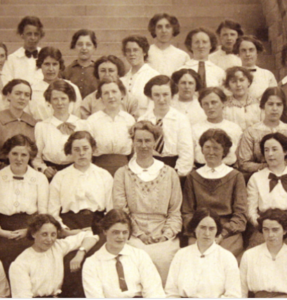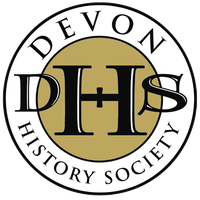Wodehouse, Dr Helen, The Rectory, Bratton Fleming

Helen Wodehouse (centre) with Bingley College students in 1914
Photograph courtesy of Friends of Bingley College
Helen Marion Wodehouse[1] (1880-1964) was born on 12 October 1880 in the rectory at Bratton Fleming, where her father, Philip John Wodehouse was Rector. Philip Wodehouse, a former Fellow of Gonville and Caius College, Cambridge, had been presented to the living of Bratton Fleming by the College in 1875.[2] In 1879, two years after his first wife and their infant daughter had died, Wodehouse married Marion Bryan Wallas, daughter of Rev. Gilbert Wallas, the Rector of Shobrooke and former Vicar of Barnstaple.[3]
The couple shared a love of chess which they both played competitively as county representatives by correspondence.[4] Marion was a keen musician; Philip played cricket. They had four children: Helen (b.1880) Christine (b.1881), Philip George (b.1883) and Charles Gilbert (b.1885). Philip senior’s younger brother Henry Ernest Wodehouse was the father of the well-known comic novelist, P.G. Wodehouse. Marion had eight siblings; her sister Katharine had been an early mathematics student at Girton College Cambridge and her brother Graham was to become a founder member of the London School of Economics and to marry Devon Suffrage Activist Ada Radford (q.v.).
The Wodehouse children grew up in a large early Victorian rectory (17 rooms were recorded on the 1911 census) with extensive grounds and gardens often used for parish fetes, and with two resident servants. Both their parents were indefatigable workers in the parish, and the children, particularly though not exclusively the girls, would become involved in putting on entertainments to raise funds for good causes such as the Church of England Society Homes for Waifs and Strays, or the parochial reading room and library.[5] They were also part of Barnstaple society, attending events such as the annual Children’s Fancy Dress Ball in the Assembly Rooms.[6]
Philip Wodehouse was committed to improving education: he regularly inspected and reported on church schools for the diocese and became a member of the Barnstaple Society for University Extension.[7] Later, when the County Council began to run technical education classes he and Marion were heavily involved in promoting evening classes in Bratton Fleming in sheep-shearing, butter making, hedging and ditching and dressmaking.[8] The Wodehouses were also active in securing a good education for their children to prepare them for professional life. The boys went into the navy (Philip) and to Haileybury (Charles). Christine (q.v.) seems to have remained in the home.
Helen’s interest in writing and the past began early. When she was seven she won third prize in a national children’s magazine, Little Folks, for a story based on a published picture, in this case of Stonehenge.[9] When she was 13 Helen went away from home for her secondary education. She went to London, to Notting Hill High School where Marion’s sister Katharine taught mathematics. She probably lived with her aunts in London, where Frances kept house for Theresa and Katharine, both of whom were teaching. Life in London provided a sharp contrast to her home in Devon, and some of her home-sickness was perhaps expressed in a poem she wrote in the school magazine, Near Exmoor, celebrating the countryside ‘round about Leaworthy’[10]
Although Helen was a regular prize winner in a range of subjects, and passed her Oxford and Cambridge Board Higher Certificate in ‘Latin and Greek with distinction in English, French and Mathematics’ in 1897, it was Mathematics she chose to read at Girton College, Cambridge, to which she went up as an exhibitioner in 1898.[11] She was awarded a second class degree, and then stayed on a year to read for the Moral Sciences Tripos, in which, in 1902, she was awarded a first. She then took a Teacher’s Higher Diploma (1903), an MA in 1904 and a D.Phil. in 1906, all at the University of Birmingham, where she was able to live with another of her Wallas aunts, Mary, wife of Professor Muirhead.[12]
Helen taught philosophy at the University of Birmingham between 1903 and 1911, when she was appointed as Principal at the recently established teacher training college at Bingley, in the West Riding of Yorkshire.[13] The first public references to her suffrage activism come from her time in Bingley, although she may have been involved at a much earlier date, as her aunt Katharine was certainly a strong supporter of the movement, standing for election to the London County Council in 1913, where she was appointed alderman and by the end of the First World War the deputy chair. Dr Wodehouse is recorded presiding at the Bingley National Union of Women’s Suffrage Societies (NUWSS) social in April 1912; as part of a deputation to lobby the local anti-suffragist MP in December 1912; and she proposed the vote of thanks at the first Bingley NUWSS Annual General Meeting in April 1913.[14] In her speech on that occasion she said that ‘it was some encouragement to see that it was the way of history that there should be much disappointment before famous causes came to success. Women’s suffrage was now in its sixty-fourth year, and the outlook on the whole seemed rather promising, as this was bout the time that history took for the accomplishment of a great movement.’
At about the same time as Helen was becoming involved in the new NUWSS branch in Bingley, her sister Christine (q.v.) took on the role of Barnstaple NUWSS branch secretary. During her term of office she organised a public meeting held in April 1913 in the Parish Church Rooms, Barnstaple, and invited her sister Helen to address it, which she did with a speech described by the North Devon Journal as ‘on the highest philosophical plane’.[15]
After the vote was won Helen went on to a distinguished academic career. In 1919 she was appointed as Professor of Education (Women), the first woman professor at the University of Bristol. She led the merger of the women’s and men’s Departments of Education, which occurred in 1925. The Bristol Department of Education was highly regarded. In 1931 she was appointed Mistress of Girton College Cambridge where she remained until she retired in 1942. She wrote and published widely on education, religion and philosophy, with titles including The Presentation of Reality (1910), A Survey of Education (1924), The Scripture Lesson in the Elementary School (1926), Temples and Treasuries (1935), Selves and their Good (1936), One Kind of Religion (1944). Although as a young woman she had ceased to follow the Anglicanism of her parents, as she could not accept the concept of personal immortality, she remained a believer. She was described as ‘austere’, ‘shy’, ‘dedicated’ and ‘inspirational’.
Helen Wodehouse died on 20 October 1964 at the Park Nursing Home in Llandrindod Wells. She is buried not in Bratton Fleming with the rest of her family but in the cemetery at Llandrindod Wells.
Entry created by Marilyn Smee and Julia Neville, January 2019
[1] Census and family references from www.ancestry.co.uk
[2] Taken from obituary in the North Devon Journal (NDJ) 6 Jun 1918.
[3] NDJ, 2 Oct 1879.
[4] Taken from obituary, see note 2.
[5] NDJ, 6 Apr 1903; 26 Dec 1901.
[6] NDJ, 19 Jan 1893, 17 Jan 1895.
[7] NDJ, 21 Mar 1891.
[8] NDJ, 28 Jan 1900; 4 Oct 1900; 7 Sep 1905; 24 May 1906. Helen attended the classes in butter-making in her Long Vacation in 1900, and won first place for her essay on dairy-making.
[9] NDJ, 3 May 1888.
[10] Notting Hill High School Magazine, March 1899, p.6. One stanza runs ‘Devonshire, Heavenshire/ Utter peace fills/ All the high valleys/ All the golden hills. All references to The Notting Hill High School magazine available at: http://www.nhehsarchives.net/authenticated/Browse.aspx?BrowseID=142&tableName=ta_schoolchronicle (accessed 10 Jan 2019).
[11] Notting Hill High School Magazine, March 1896, 28; March 1897, 26; March 1898, 34; March 1899, p.35.
[12] Helen’s academic career is described in two articles, one from the Friends of Bingley College https://bingleycollege.co.uk/helen-wodehouse/ and one from the University of Bristol http://100stories.edn.bris.ac.uk/education/centenary/stories/story/in-1964-when-she-died-helen-/50/ (both accessed 10 Jan 2018).
[13] NDJ, 25 May 1911.
[14] Common Cause (CC), 25 Apr 1912, 43; 27 Dec 1912, 661; 25 Apr 1913, 45.
[15] CC, 2 May 1913.
